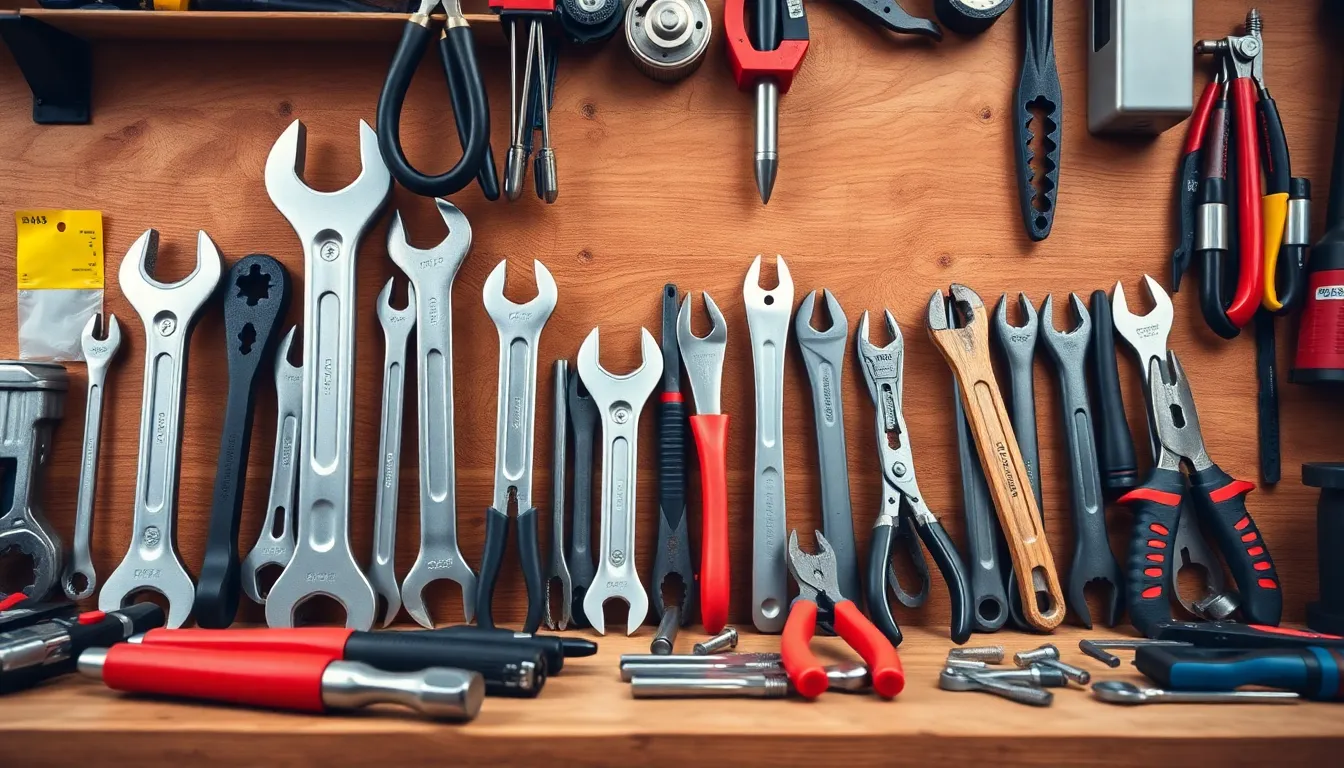Every mechanic knows that having the right tools can mean the difference between a smooth ride and a bumpy breakdown. Imagine trying to fix a car with nothing but a butter knife and a prayer. Not ideal, right? That’s where a well-curated automotive workshop tools list comes into play. It’s like having a treasure map that leads straight to the gold—only in this case, the gold is your ability to tackle any automotive challenge that rolls into your shop.
Table of Contents
ToggleOverview of Automotive Workshop Tools
Automotive workshop tools play a critical role in effective vehicle maintenance and repair. A well-equipped workshop enhances efficiency and ensures high-quality work. Essential hand tools include wrenches, screwdrivers, and pliers, which tackle various tasks, from loosening bolts to tightening screws.
Power tools such as impact wrenches and electric drills speed up processes significantly, reducing manual effort. Necessary diagnostic equipment, including OBD-II scanners, allows mechanics to identify faults quickly. Lifting equipment like hydraulic lifts and jacks promotes safety by easily accessing vehicle undercarriages.
Specialty tools cater to specific jobs within the automotive field. Examples include alignment tools for accurate wheel adjustments and bearing pullers for efficient bearing removal. Moreover, quality safety gear, such as gloves and goggles, protects technicians from hazards during repairs.
Organizational tools contribute to workspace efficiency. Toolboxes and magnetic tool holders keep items accessible while minimizing clutter. Complete automotive workshop tool lists encompass basic to advanced tools, ensuring every mechanic is prepared for any job.
Investing in high-quality tools yields long-term benefits. Reliable tools enhance precision and durability, making them indispensable for any automotive workshop. A comprehensive tools list fosters confidence in car repair, allowing mechanics to navigate challenges successfully.
Essential Hand Tools

Essential hand tools form the backbone of any automotive workshop. Mechanics rely on these tools to perform a variety of tasks efficiently.
Wrenches
Wrenches come in various sizes and types, including open-end, box-end, and adjustable wrenches. Open-end wrenches feature a U-shaped end designed for quick access to fasteners. Box-end wrenches provide a secure grip around nuts and bolts, preventing slippage during high torque applications. Adjustable wrenches allow flexibility in gripping different sizes easily. Mechanics often use torque wrenches to ensure precise tightening of fasteners, which enhances the longevity of repairs. Investing in a high-quality set of wrenches keeps a workshop running smoothly.
Screwdrivers
Screwdrivers are indispensable for working with various screws in automotive repairs. Flat-head screwdrivers fit within standard slots, while Phillips screwdrivers work well with cross-shaped screws. Torx and hex screwdrivers cater to specialized fasteners found in modern vehicles. Quality screwdrivers reduce the risk of stripping screws during use. Magnetic screwdrivers help retrieve dropped screws from tight spaces, saving time. Including various sizes and types ensures adequate coverage for most tasks, contributing to overall efficiency.
Pliers
Pliers offer gripping, twisting, and cutting capabilities essential for many automotive tasks. Needle-nose pliers fit into tight areas, allowing mechanics to manipulate small components easily. Slip-joint pliers provide adjustable jaws for a firm grip on various objects. Locking pliers serve as clamps, holding pieces firmly for hands-free operation. Diagonal-cutting pliers handle wire and cable cutting with precision. A diverse set of pliers enhances a mechanic’s ability to tackle a wide range of repairs, making them invaluable in any workshop.
Power Tools for Automotive Work
Power tools play a crucial role in enhancing efficiency and effectiveness in automotive workshops. Mechanic tasks become significantly faster and easier with the right power tools.
Impact Wrenches
Impact wrenches offer high torque output, making them essential for loosening or fastening bolts quickly. These tools excel in applications like tire changes and suspension work, where heavy-duty performance is necessary. Pneumatic and electric models provide options based on the workshop’s setup. Consider torque adjustment features for precision in fastening. Various socket sizes accommodate a wide range of vehicle components. Reliability in performance is vital, as it minimizes downtime and boosts productivity.
Drills
Drills serve multiple purposes, ranging from creating holes to driving screws. Car repair technicians often use electric drills for versatility and speed. Cordless models allow for mobility, especially in tight spaces, while corded drills supply consistent power. Features like variable speed control enhance user experience across different tasks. Choosing the right drill bits, such as masonry or metal options, ensures compatibility with various materials. A quality drill becomes an indispensable asset in any automotive workshop, streamlining multiple processes.
Diagnostic Tools
Diagnostic tools play a critical role in identifying and troubleshooting issues in automotive systems. They enable technicians to assess vehicle performance accurately and address problems efficiently.
Code Readers
Code readers serve as essential tools for any automotive workshop. They read and clear diagnostic trouble codes generated by the onboard computer. With these devices, mechanics can quickly pinpoint issues within the engine, transmission, or exhaust systems. Notably, many modern code readers also offer real-time data monitoring, which enhances diagnostic capabilities. Some models connect via Bluetooth for added convenience, allowing mechanics to read codes wirelessly. Utilizing a code reader can significantly reduce diagnosis time, increasing workshop productivity.
Multimeters
Multimeters are vital for measuring electrical values like voltage, current, and resistance. These instruments help technicians test wiring and electronic components effectively. A mechanic can quickly identify faulty sensors or short circuits with a multimeter. Additionally, digital multimeters provide clear readouts, making it easier to analyze data. Some advanced models include features like data logging and temperature measurements. Investing in a quality multimeter enhances the shop’s ability to handle electrical diagnostics, ensuring accurate repairs and maintenance.
Safety Equipment
Safety equipment forms an integral part of any automotive workshop. Proper protective gear not only ensures technician safety but also enhances overall efficiency during repairs.
Gloves and Eye Protection
Gloves protect hands from sharp edges, hot surfaces, and chemicals. Various glove types, such as nitrile or latex, offer different levels of protection, depending on the task. Eye protection shields against flying debris, sparks, and chemical splashes. Safety goggles with impact resistance ensure clear vision while working on complicated repairs. The combination of gloves and eye protection significantly reduces the risk of injury, making these items essential for any workshop environment. Keeping a supply of both gloves and eyewear on hand sustains safety protocols and promotes a secure working atmosphere.
Fire Extinguishers
Fire extinguishers serve as a crucial element in workshop safety. Various types, including ABC extinguishers, cover most fire risks associated with automotive work. Placement near high-risk areas, such as fuel storage, enhances emergency response capabilities. Regular inspections ensure extinguishers remain operational and adequately charged. Maintenance supports long-term reliability and compliance with safety regulations. Training technicians to understand fire safety protocols further strengthens workshop safety. Having fire extinguishers readily accessible can make the difference during a critical moment.
Having a comprehensive automotive workshop tools list is crucial for any mechanic aiming for success. The right tools not only enhance efficiency but also ensure high-quality work in every repair job. From essential hand tools to advanced diagnostic equipment, each item plays a vital role in addressing various challenges that arise in automotive maintenance.
Investing in quality tools and safety equipment fosters a productive work environment and protects technicians during repairs. By curating a well-thought-out tool list, mechanics can confidently tackle any task, ensuring vehicles receive the best care possible. Embracing this approach ultimately leads to smoother operations and greater customer satisfaction in the automotive industry.


